Say Hi to ISO 9001 without the process chaos
Quality management automation that wins contracts. Get audit-ready in weeks, not months. Standardise processes, demonstrate excellence, close bigger deals.
What is ISO 9001, and why does it matter?
ISO 9001 is the world's most trusted quality standard. It's also been a proper nightmare to implement without losing your mind.
Whether you're chasing enterprise contracts or avoiding another "can you prove your processes work?" email, ISO 9001 shows customers you deliver quality consistently.
No more 3am spreadsheet panic when RFPs ask for evidence.
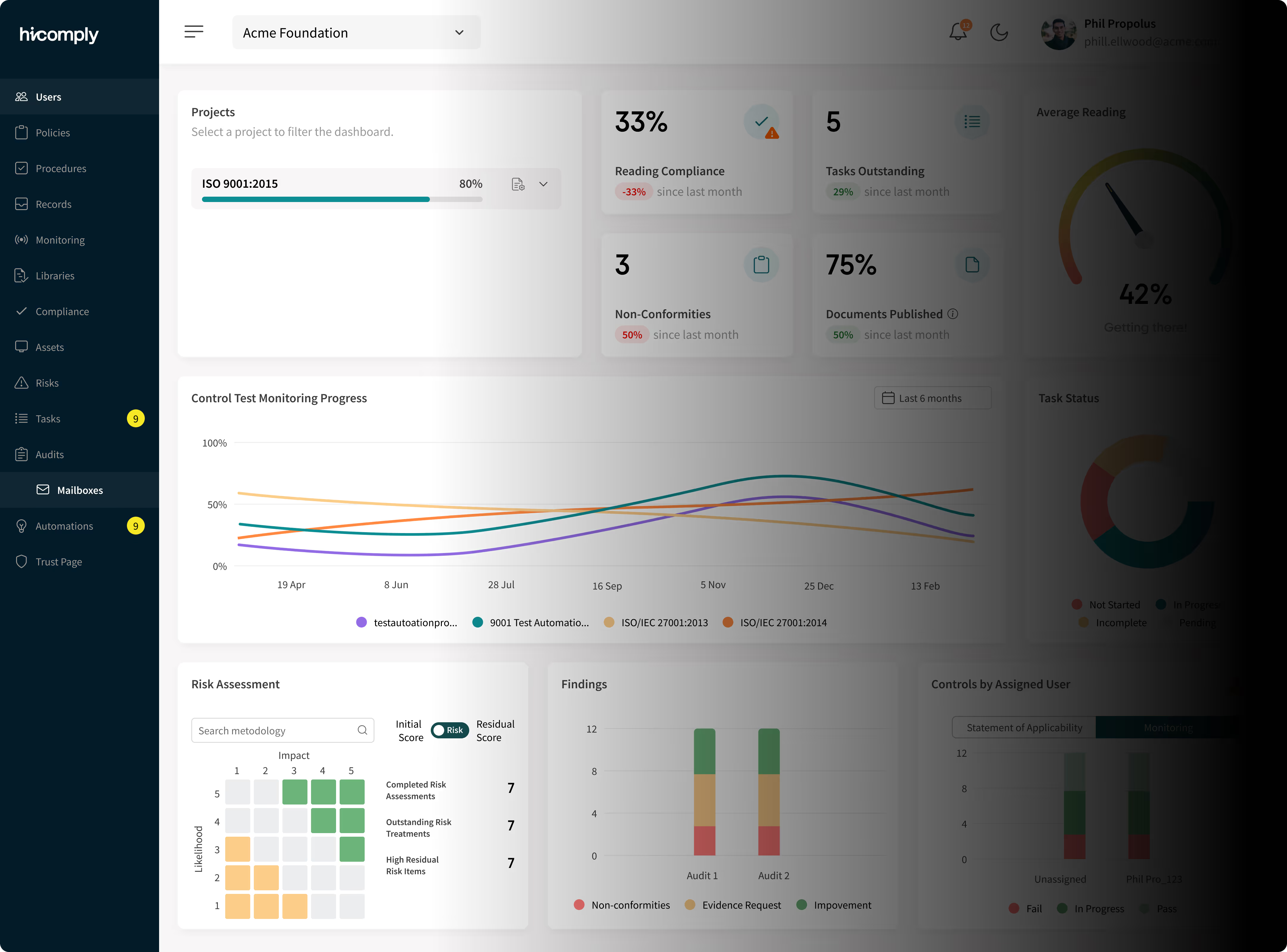
Quality Excellence in 90 Days
Map your processes, deploy controls, pass your audit. Predictable path, no quality theatre.
QMS scoping, process mapping, baseline assessment.
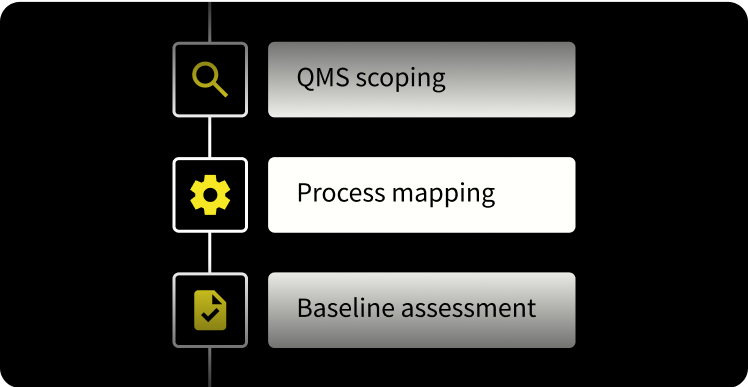
Policy deployment, team training, control testing.
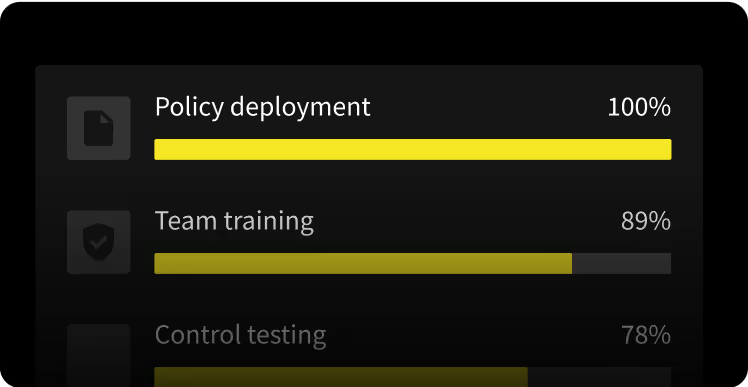
Evidence preparation, auditor workspace, final validation.
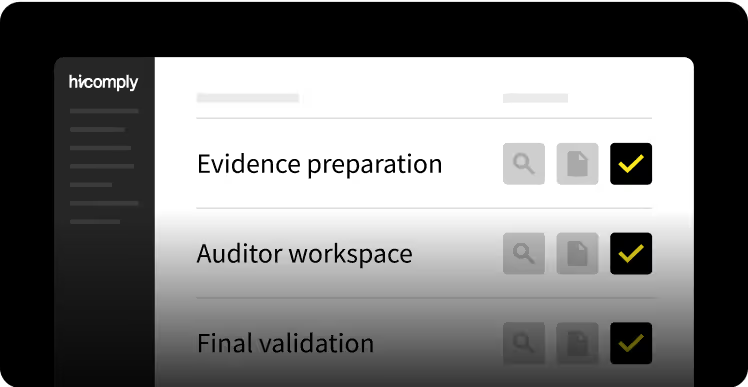
ISO 9001 That Actually Delivers Results
Stronger proposals, smoother operations, faster growth. Quality becomes your differentiator.

Enterprise buyers need ISO 9001. Get certified without the usual process nightmare.

Evidence collects automatically. Your team focuses on improvement, not paperwork.

Quality certification in RFPs becomes "yes, here's our certificate" instead of six-month scrambles.

Your ISO 9001 foundation powers ISO 14001, 27001, and future frameworks.

Continuous monitoring means no last-minute panic when renewal comes around. That moment when an auditor asks for evidence... and you already have it.

Demonstrate systematic quality management. Reduce disputes, increase retention.
All-in-One Quality Management Toolkit
Manage processes, policies, risks and evidence in one workflow. Make quality systematic.
Define your quality management system boundaries and build controls that fit your actual operations
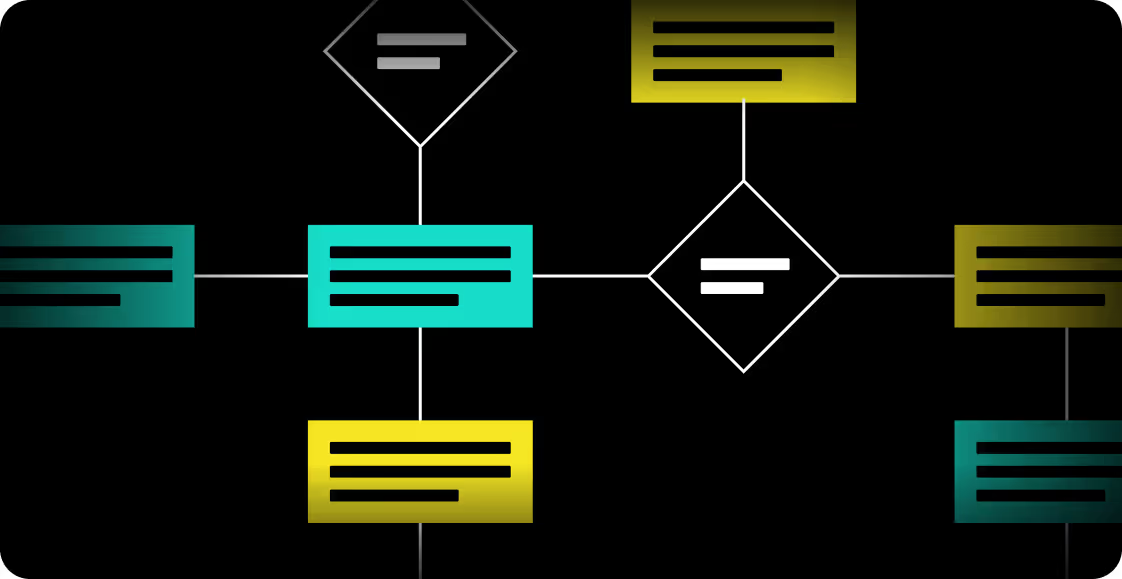
Map workflows, assign owners, track improvements with built-in ISO 9001 methodology

Generate ISO 9001-compliant procedures in minutes with auditor-approved templates
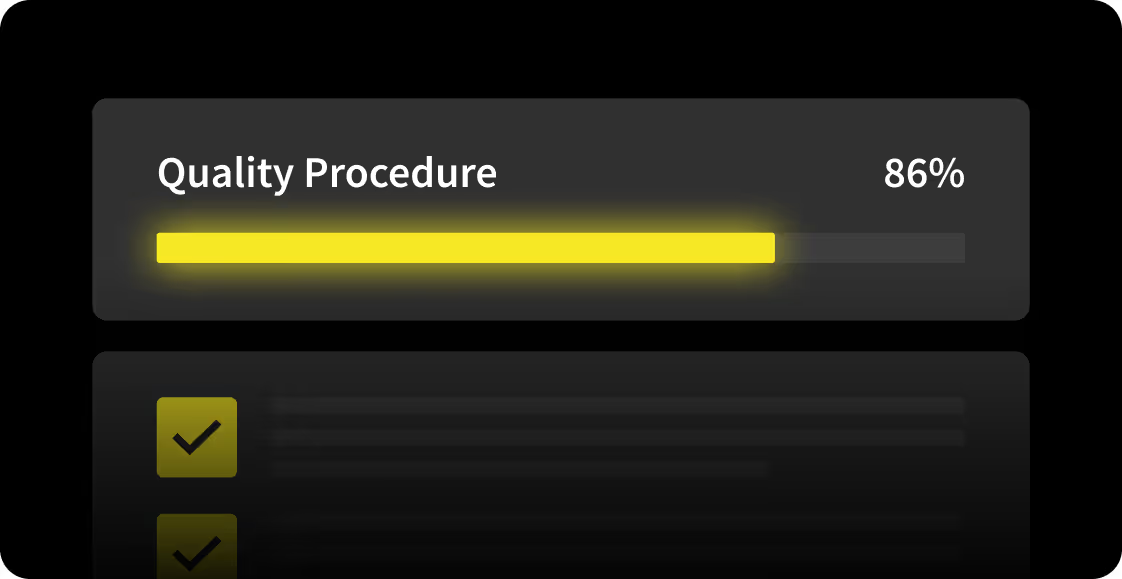
Built-in quality risk assessment linked to your process register and customer requirements
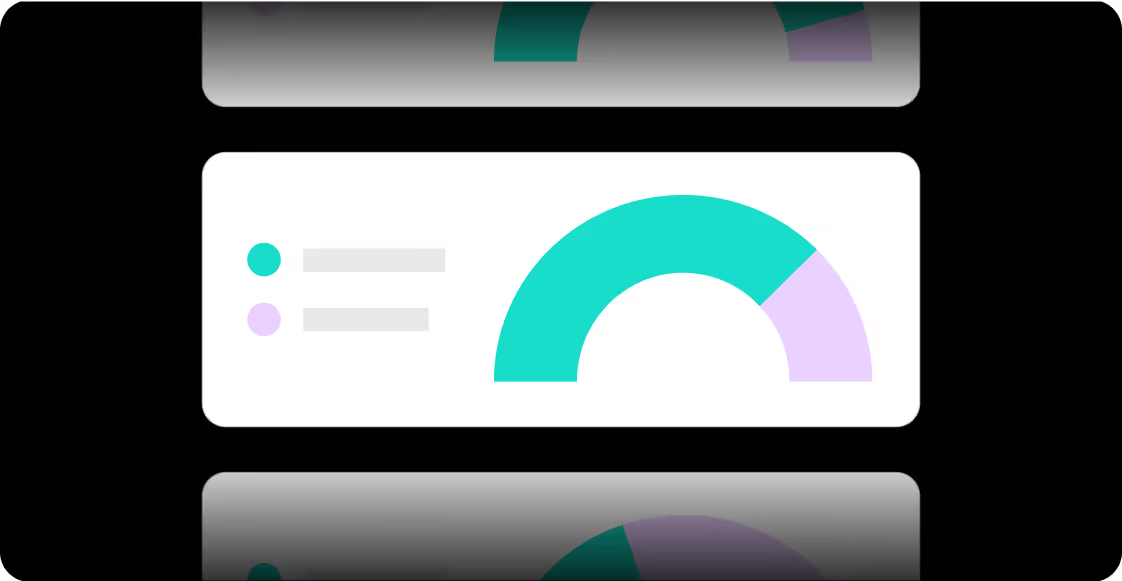
Immutable record of process changes, training completions, and improvement actions
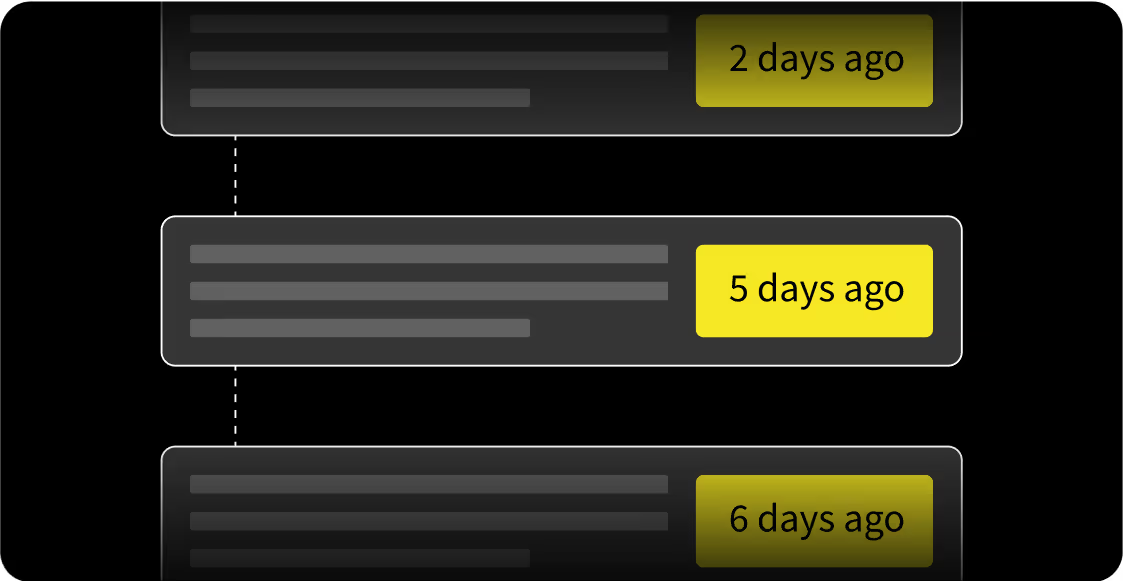
Export-ready packages with timestamps, approvals, and version control that auditors love
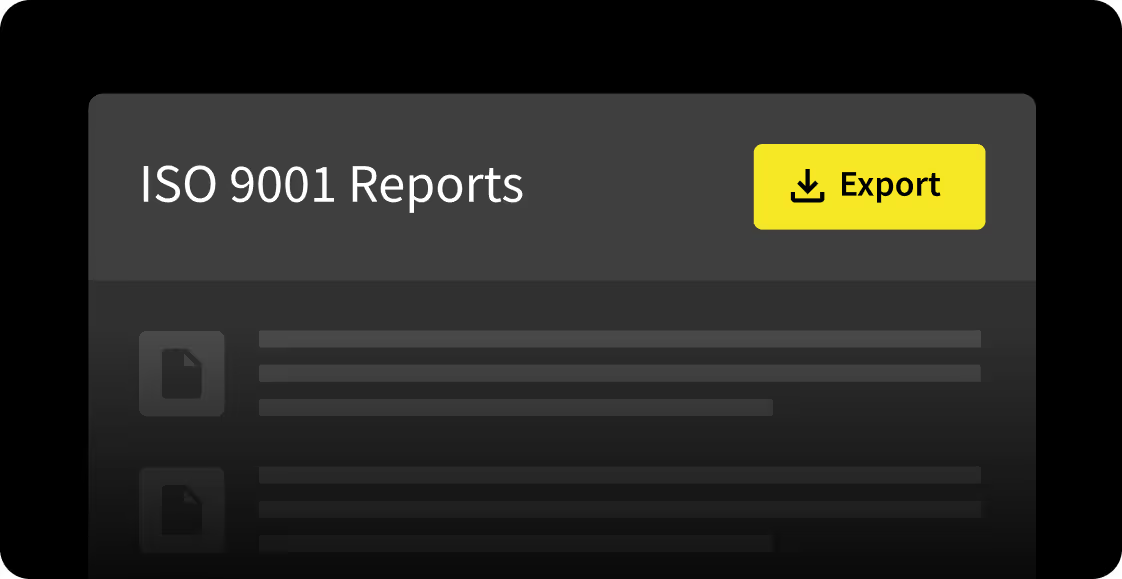
Why teams choose Hicomply for ISO 9001
Stories from companies who got certified without the usual process theatre.
Hicomply has completely transformed the way that we manage our ISO27001 certification. We purchased Hicomply a few months before our re-certification was due. Zoe worked with us to set up everything up and show us how to use the platform most efficiently. She has been an amazing support to myself and my colleague as we navigated through this process.


"Implementing Hicomply has streamlined our compliance processes, making it more efficient to manage and maintain our ISO certifications. The platform's intuitive design and comprehensive features have been instrumental in enhancing our operational excellence."

%2013.avif)
“The things that we've seen this product and service deliver has far exceeded what we originally thought we would get from it."


FormusPro achieved ISO 27001 certification in under six months. Less than half the typical timeline predicted by other providers.


From start to finish, the service and engagement from Hicomply has been fantastic… Whenever we had any questions, the team were always on hand to offer advice.


Hicomply has reduced our compliance preparation time by over 50%, ensuring we’re always audit-ready. It’s a game-changer for maintaining trust with clients.


I have found Hicomply to be incredibly useful as a platform for a new company… it has taken the stress out of our hands.


Organization at its finest. A great sorting system—I can easily find new articles that I need to review with a click.


Very interactive, not boring at all. It’s straight to the point and teaches you things in an interactive way.


Hicomply delivers a refreshingly streamlined experience in compliance management… What truly sets them apart is their outstanding support.


Easy to use and straightforward for confirming you’ve read the necessary documents. The dashboard lets you see what your direct reports have completed.


Possibly the most helpful feature about Hicomply is the UI itself—user-friendly and easy to use without over-complicating things.


Easy way to track compliance learning. A simple product that makes keeping up to date with policy changes simple.


“The real benefit of Hicomply, as far as I’m concerned, is twofold: the software and the personnel. It’s an all-encompassing tool that consolidated everything and enabled us to deliver on our commitments with confidence.”
.avif)

Hicomply is particularly user-friendly for someone unfamiliar with this type of software… It’s making us more organised.


Very interactive, not boring at all. It’s straight to the point and teaches you things in an interactive way.


Easy to use and straightforward for confirming you’ve read the necessary documents. The dashboard lets you see what your direGreat app for ISO implementation and auditing—task managing, informative dashboard, intuitive to implement.ct reports have completed.


Ready to stop scrambling for audit evidence?
See how teams go from process chaos to audit confidence.
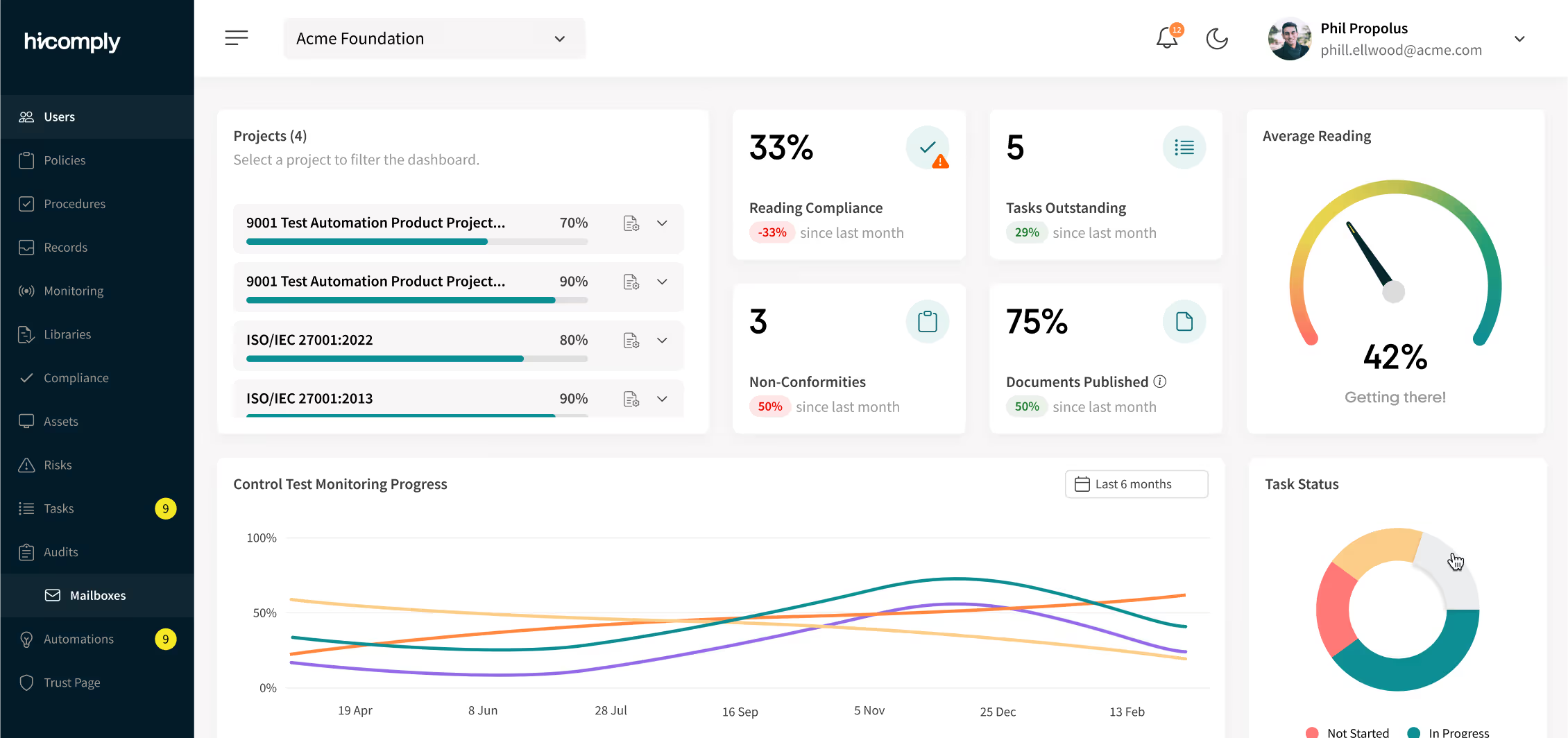
ISO 9001 hub highlights
The essential guides, checklists and templates that actually help.
Got questions? Start here
Planning your first quality audit? These will help. For anything else, just ask.
What's the difference between ISO 9001 and other quality standards?
ISO 9001 is the international quality management standard that works for any industry. Other standards like ISO 13485 (medical devices) or AS9100 (aerospace) are sector-specific versions. ISO 9001 is your foundation - everything else builds on it.
How does ISO 9001 compare to ISO 27001?
Different worlds entirely. ISO 9001 focuses on quality management - proving your processes deliver consistent results. ISO 27001 is about information security management. Most growing companies need both, and what you build for one framework helps with the other.
Who actually needs ISO 9001 certification?
Anyone selling to enterprise customers or bidding on tenders where quality certification is required. It's particularly valuable for manufacturing, professional services, and any business where "prove your processes work" is a common procurement question.
How long does ISO 9001 implementation actually take?
Implementation timeframes vary widely depending on organisation size and existing processes. Traditional manual approaches can take 6-18 months. Hicomply's automation significantly reduces this timeline by handling documentation and evidence collection automatically.
What are the main ISO 9001 requirements?
You need a Quality Management System (QMS) that covers customer requirements, process control, risk management, and continuous improvement. The key is proving your processes are documented, followed, and actually work. Less paperwork theatre, more real results.
Is ISO 9001 certification worth the investment?
Companies typically see ROI within the first year through faster deal cycles, access to bigger contracts, and reduced quality issues. The certification fee is nothing compared to contracts you can't bid for without it.
What's the difference between ISO 9001:2015 and earlier versions?
ISO 9001:2015 introduced risk-based thinking and simplified the documentation requirements. Less bureaucracy, more focus on what actually improves your business. If you're still on 2008, the transition deadline has passed.
Can small businesses implement ISO 9001?
Absolutely. The standard scales with your size. You don't need enterprise-grade everything from day one. Our automation makes it accessible for growing teams without traditional consulting overhead.
How does ISO 9001 help win tenders?
Many RFPs require quality certification as a basic qualification. Without ISO 9001, you're not even in the conversation. With it, you demonstrate systematic quality management that buyers trust.
What's the ongoing maintenance for ISO 9001?
Annual surveillance audits and a full recertification every three years. With continuous monitoring, this becomes routine rather than a scramble. That moment when auditors ask for evidence... and you already have it.
How does Hicomply make ISO 9001 implementation easier?
We automate the boring bits - evidence collection, policy management, compliance tracking. Your team handles approvals and improvements, not administrative slog. It's quality management that doesn't slow you down.






